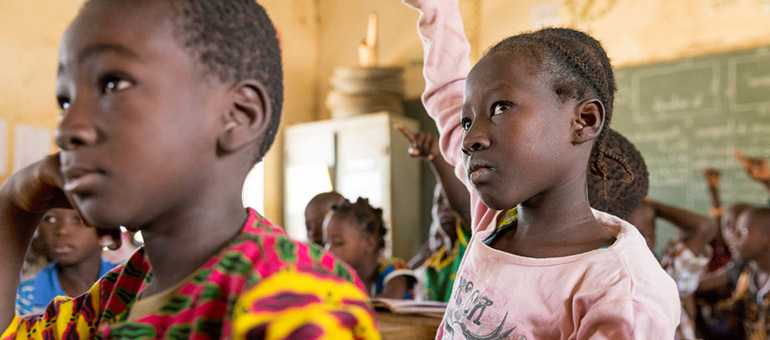
Tackling disadvantage in education from the early years in sub-Saharan Africa and South Asia
Evidence from the Research for Equitable Access and Learning (REAL) Centre has shifted the focus in global education policy towards early years and children disadvantaged by poverty, gender, disability and location.
Our work
The REAL Centre works systematically with research and policy organisations in sub-Saharan Africa and South Asia to undertake research that will have benefits for policy and practice. Recent research has highlighted that children from the most disadvantaged backgrounds – especially the poorest girls and those with disabilities – are at serious risk of not completing primary school. Even when they do, they often lack basic literacy and numeracy skills. Much of the Centre’s work has highlighted or informed appropriate interventions to address that challenge.
Examples include research in Ghana that has demonstrated the benefits of the Complementary Basic Education programme for children who have missed out on formal schooling. The research highlighted the positive impact of the programme on providing out of school children with a pathway back into formal schooling.
For those who do complete primary school, targeted approaches are needed to give them the opportunity to transition to secondary school. Evidence from work with the NGO Campaign for Female Education (CAMFED) in Tanzania, demonstrated the positive effects on retention and learning of a programme targeted at supporting marginalised girls.
As another example, evidence from a large-scale analysis in Pakistan, identified the importance of providing children with disabilities with the necessary resources and support to enable them to access quality schooling.
Much of this research has been synthesised by Centre members to provide evidence for policy-makers to tackle education disadvantage.
The results
The REAL Centre’s work influenced the Department for International Development (DFID) 2018 Education Policy, ‘Get Children Learning’, which ultimately resulted in a spending commitment of £20.5 million on research to inform early childhood education programming. It also influenced a further investment of £500 million to reach 1.9 million of the world’s most marginalised girls as part of DFID’s ‘Leave No Girl Behind’ programme.
A collaboration with the children’s charity Theirworld, which highlighted how little governments and donors invest in early childhood education, influenced UNICEF’s commitment to spend 10% of its education budget on early childhood education. The REAL Centre’s research proved the need for a Sustainable Development Goals indicator on achieving minimum proficiency level in reading and maths by grade 2 or 3. It has also shaped global advocacy on education for children with disabilities, in particular by informing a focus on inclusive action at the first Global Disability Summit.
The effects of the REAL Centre’s research have also been felt at a nation-specific level. Research on the Complementary Basic Education programme persuaded the government of Ghana to commit 1% of its education budget to support the continuation of the programme from 2019 – funding that will support around 450,000 of the country’s most disadvantaged children. And in Tanzania, analysis of an education programme developed by CAMFED enabled the charity to raise £18 million in funding for marginalised children, including 16,200 of the most marginalised girls.
